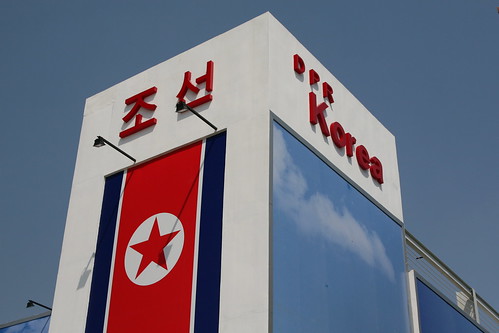
SEOUL – North Korea’s system is failing. The country is facing severe energy constraints, and its economy has been stagnating since 1990, with annual per capita income, estimated at $1,800, amounting to slightly more than 5% of South Korea’s. Meanwhile, a food shortage has left 24 million North Koreans suffering from starvation, and more than 25 of every 1,000 infants die each year, compared to four in South Korea. In order to survive, the world’s most centralized and closed economy will have to open up.
A more dynamic and prosperous North Korea – together with peace and stability on the Korean Peninsula – would serve the interests not only of North Korea itself, but also of neighboring countries and the broader international community. After all, North Korea’s sudden collapse or a military conflict on the peninsula would undermine regional security, while burdening neighboring countries with millions of refugees and hundreds of billions of dollars in reconstruction costs.
This should spur international institutions and North Korea’s neighbors to provide the food aid, technical assistance, and direct investment that the country needs to escape its current predicament and make the transition to a market economy. But there remain significant obstacles to such cooperation – not least the North’s obscure and often-unpredictable politics, exemplified by the recent execution of its leader Kim Jong-un’s once-powerful uncle, Jang Song-thaek.
The good news is that North Korea’s leadership seems to understand that its current troubles stem from its grossly inefficient economic system. In recent speeches, Kim has emphasized the need for economic reform and opening up to develop agriculture and labor-intensive manufacturing industries.
Furthermore, in a bid to attract foreign investment, the government has announced the establishment of 14 new special economic zones. If only out of a sense of self-preservation, North Korean political and military leaders are likely to support this effort, as long as it does not undermine their power or national security.
Officially, North Korea began opening up to foreign investors in 1984, when the government enacted the Foreign Joint Venture Law, following the success of a similar law in China. In 1993, North Korea continued this effort by establishing the Rajin-Sonbong special economic and trade zone. But these initiatives have yet to yield significant results, with foreign investors wary of operating in a country that lacks both economic-policy credibility and the physical and institutional infrastructure needed to support large-scale projects.
North Korea now should follow the examples of Vietnam and China, pursuing reforms like deregulation, liberalization, privatization, and macroeconomic stabilization, while developing a new legal system and new institutions. Such market-based, outward-oriented economic policies are a prerequisite for long-term economic growth.
The country certainly does not lack growth potential. While North Korea does not have the agricultural base that initially spurred reforms in China and Vietnam, geographical advantages like natural seaports and rich mineral resources enable it to pursue export-led growth.
Moreover, the relative abundance of well-educated workers implies low initial wages and the ability to compete internationally in labor-intensive manufacturing activities – for example, in footwear, textiles and garments, and electronic assembly – which can form the basis for export-led industrialization. To this end, a significant share of North Korea’s military manpower, which currently amounts to more than 8.5% of the total labor force, could be used for more productive purposes.
If the relevant conditions are satisfied, North Korea could capitalize on the “catch-up” effect, boosting growth further, because its low per capita income level would help to increase investment productivity and facilitate technology transfer from more developed economies.
This implies a significant role for North Korea’s neighbors, especially South Korea and Japan. So far, however, the Kaesong Industrial Complex, operating with about 50,000 North Korean workers under South Korean management, is the only case of economic cooperation between the two Koreas.
North and South Korea are natural trading partners. In 2012, inter-Korean trade amounted to $2 billion – only 0.2% of South Korea’s total trade, but 29% of North Korea’s. According to the economist Marcus Noland, normalized trade relations could increase South Korea’s share of the North’s trade volume to as much as 60%.
With a strong commitment to economic reform and opening up – backed by robust international support – North Korea could emulate the success of East Asian economies like South Korea, experiencing annual growth of more than 5% for the next several decades.
But there is more to North Korea’s situation than economics. The country is locked in a stalemate with the international community, which wants it to denuclearize and become a “normal” country. Unwilling to abandon its nuclear-weapons program, North Korea faces economic sanctions from the United States, with official aid and membership in institutions like the World Bank and the International Monetary Fund on hold.
Given how unlikely North Korea is to denuclearize, at least in the immediate future, an alternative strategy is needed. The international community, especially South Korea, should support North Korea’s efforts to build a more open, market-based economy through expanded trade and investment, while continuing to work toward a compromise on denuclearization. The resulting prosperity and accessibility could, over time, bring about political change.
For ordinary North Koreans, who are suffering the most under the current system, such a transformation could not be more urgent.
Copyright Project Syndicate
Lee Jong-Wha, Professor of Economics and Director of the Asiatic Research Institute at Korea University, was a senior adviser for international economic affairs to former President Lee Myung-bak of South Korea.
For additional reading on this topic please see:
Understanding North Korea
The Elusive Nature of North Korean Reform
China’s Policy on North Korea
For more information on issues and events that shape our world please visit the ISN’s Weekly Dossiers and Security Watch.

